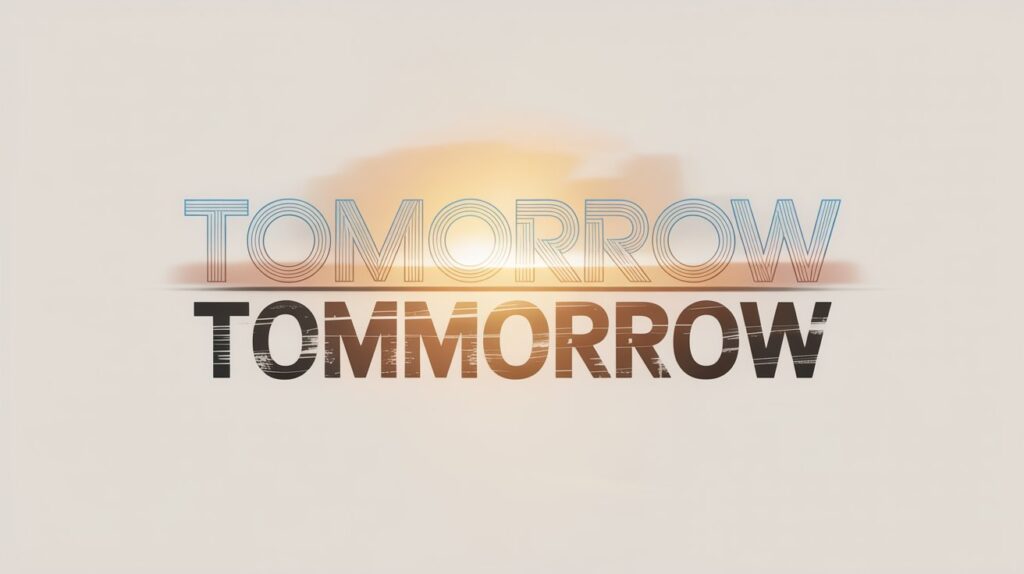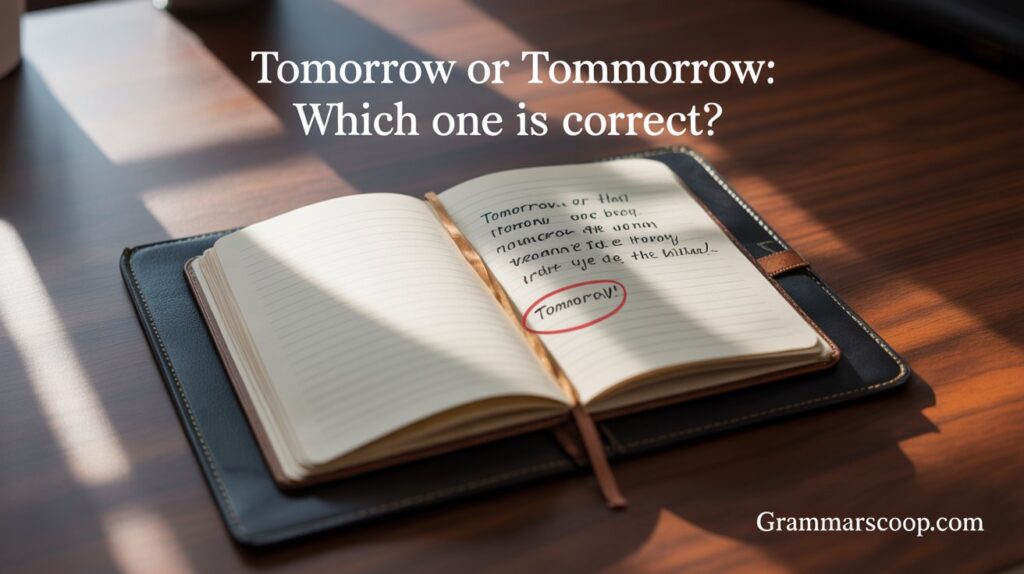Misspelling even a simple word like tomorrow can hurt your writing’s clarity and credibility. You’ve probably asked yourself: Is it tomorrow or tommorrow? You’re not alone. This is one of the most common mistakes in English spelling, and it sneaks into everything from school assignments to professional emails.
This guide clears up the confusion with real explanations, examples, tables, and grammar tips you’ll actually use. You’ll also learn how to remember the correct spelling of tomorrow, avoid spelling mistakes, and improve your professional appearance through better writing.
The Correct tomorrow spelling
The correct spelling is always tomorrow — with one “m” and two “r”s.
“Tomorrow is often the busiest day of the week.” — Spanish Proverb
What Makes It Correct?
- Spelling: Tomorrow
- Pronunciation: /təˈmɒroʊ/
- Word type: Noun or adverb
Usage in a Sentence
- I’ll finish the report tomorrow.
- Let’s talk more tomorrow morning.
Despite how it sounds, there’s no double “m.” This is a phonetic confusion caused by the way we speak quickly.
Why “Tommorrow” Is Incorrect
Tommorrow is a misspelling that shows up in informal writing, especially in texts or emails. Adding the extra “m” may seem minor, but it’s still wrong.
Why It Happens
- Phonetics: It sounds like there are two m’s
- Typing errors: Repetitive keystrokes add an extra m without realizing it
- Visual memory: People assume symmetry in the word and mirror the r’s with m’s
- Autocorrect issues: Some keyboards learn your habits and start suggesting the wrong spelling
“Autocorrect may fix typos, but it won’t fix habits.”
This is why it’s essential to understand the real spelling rules and not rely entirely on spell-check tools.
Word Origin and Etymology

To understand why tommorrow is incorrect, it helps to know where tomorrow comes from.
Old English Roots
The word evolved from the Old English “to morgenne”, which meant on the morrow (morrow = morning/day after).
Middle English Changes
In Middle English, it became “tomorwe” or “to-morrowe”. Eventually, the hyphen dropped, and the spelling became standardized as tomorrow.
Why This Matters
Understanding a word’s etymology helps reinforce the correct spelling in your brain. It also explains why you only need one “m” — the root word “morrow” never had two m’s.
Common Misspellings and Why They Happen

Let’s break down the most frequent misspelled words related to tomorrow.
Top Misspellings
| Incorrect Spelling | Why It’s Wrong |
|---|---|
| Tommorrow | Adds an unnecessary extra “m” |
| Tommorow | Double “m” and single “r” |
| Tomorow | Missing an “r” |
| Tommoroww | Typing error with extra letters |
| Tomorroe | Ends with the wrong vowel |
| Tommorrrow | Adds one too many r’s |
Root Causes of Misspellings
- Fast typing
- Lack of proofreading
- Autocorrect limitations
- Poor memory of word shape
- No understanding of the word origin
Why Spelling “Tomorrow” Right Actually Matters
Spelling isn’t just for school. Getting words right — especially basic ones like tomorrow — directly affects your image.
Real-World Impact
- Professional appearance: Misspelling makes you seem careless
- Academic implications: Teachers dock points for errors
- SEO and content writing: A single mistake can hurt your search visibility
- Job applications: Recruiters spot mistakes instantly
“One spelling mistake can make a resume blend in — or stand out for the wrong reasons.”
Using the correct spelling in even the smallest interactions boosts your credibility.
Tomorrow vs. Tommorrow: Visual and Contextual Comparison
Here’s a quick look at the tomorrow vs. tommorrow side-by-side comparison:
| Word | Correct? | Sample Sentence |
|---|---|---|
| Tomorrow | Yes | I’ll call you tomorrow at noon. |
| Tommorrow | No | (Wrong) I’ll see you tommorrow morning. |
Common Mistake Demonstrations
- “See you tommorrow!” — No
- “Let’s meet tomorrow after class.” — Yes
Auto-Correct Limitations
- Mobile devices often correct tommorrow to tomorrow, but not always
- Some systems remember user input — even if it’s incorrect
- Predictive text can reinforce mistakes if typed repeatedly
Don’t trust autocorrect blindly. Always double-check with reliable grammar tools.
Tricks to Remember the Correct Spelling
Simple Mnemonics
- “One M, two R’s”
- “Tomorrow’s sorrow doesn’t need double m’s.”
- Chunking method: to + mor + row
- Imagine you’re saying: “To the morrow” — one M
Visualization Tips
- Picture a calendar with tomorrow circled in red — with only one “m”
- Imagine typing it slowly, focusing on each letter
Spelling Games & Apps
Use these spelling games and apps to make it stick:
- Wordle: Builds daily spelling habits
- Spelling Bee (NYT)
- Grammarly and Hemingway apps
- Dictionary.com and Merriam-Webster apps with audio support
- Quizlet: Create flashcards with the word tomorrow
READ MORE:
- Cancelation or Cancellation: Which Spelling is Correct?
- Requestor or Requester: Which Spelling to Use?
- Tieing or Tying? The Right Way to Spell It
- PickUp or Pick up, Pick-Up: What’s the Correct Usage?
Tools and Resources for Spelling Help
Use these grammar tools to avoid spelling mistakes in general:
Recommended Tools
| Tool | Purpose |
|---|---|
| Grammarly | Real-time spelling/grammar check |
| Hemingway App | Highlights unclear writing |
| MS Word Editor | Flags grammar/spelling errors |
| Quillbot | Helps rewrite and spot mistakes |
Helpful Add-Ons
- Browser extensions: For Chrome, Firefox
- Mobile keyboard settings: Enable predictive text
- Flashcard apps: Use spaced repetition for tricky words like tomorrow
Spellcheck Isn’t Always Your Friend

When Auto-Correct Works Against You
- You type tommorrow once… it learns it
- Predictive text starts suggesting the wrong word
- You stop noticing the misspelling altogether
Manual Editing Still Matters
- Reread your messages and emails
- Run spell-check manually
- Keep a short list of your misspelled words and watch out for them
Additional Tips for Accuracy
- Ask a friend to proofread
- Read your content aloud
- Set time aside just to edit spelling
Real Consequences of Misspelling “Tomorrow”
In Professional Writing
- Appears sloppy in business emails
- Lowers confidence in your communication
- Hurts your brand credibility
- Can even affect job opportunities
In Academic Settings
- Lower essay grades
- Negative feedback from teachers or peers
- Red ink on final drafts
On the Web
- Reduces your site’s trustworthiness
- Affects search rankings and SEO visibility
- May lead readers to question content quality
“Every word online is a signal to Google. Misspelled words signal carelessness.”
Fixing the Habit Once and For All
Build Visual Memory
- Practice writing the word tomorrow 10 times a day
- Say it aloud while typing it
- Use it in different sentence contexts
Context Practice
Write practice sentences:
- “Tomorrow, we launch.”
- “She won’t be here tomorrow.”
- “Let’s plan it for tomorrow afternoon.”
- “By tomorrow evening, everything should be ready.”
- “Tomorrow holds new chances.”
Reinforce with Spelling Games
- Play word games that encourage accurate spelling
- Test yourself daily until the correct spelling becomes automatic
- Use daily reminders or calendar alerts labeled “tomorrow”
Conclusion
The word is tomorrow — always one m, always two r’s. It’s not negotiable. It’s not flexible. And it’s not tommorrow.
Getting it right boosts your professional appearance, improves academic credibility, and strengthens your writing online and off.
If you’ve been spelling it wrong, that ends today — because now you’ll get it right tomorrow.
Now you know:
- Why “tommorrow” is an incorrect spelling
- Tips to avoid spelling mistakes in English
- How to remember the correct spelling of tomorrow
- Impact of misspelling “tomorrow” in professional writing
- Common misspellings of tomorrow and their corrections
- And how to use grammar tools to your advantage
Bookmark this guide. Share it. And never second-guess “tomorrow” again.

Lisa Morris is a seasoned blogger and language enthusiast with a passion for making grammar simple and engaging. At Grammar Scoop, she shares clear, concise tips that help readers master the rules of English with confidence.






